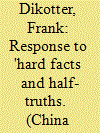|
|
|
Sort Order |
|
|
|
Items / Page
|
|
|
|
|
|
|
| Srl | Item |
| 1 |
ID:
095488


|
|
|
|
|
| Publication |
2010.
|
| Summary/Abstract |
This article aims to offer a brief assessment of the Great Famine of 1870-72 in Iran. Using contemporary sources, it is argued that the Great Famine did not have a single cause. A combination of factors gave rise to the emergence of famine. There was insufficient rainfall, but that was nothing new in Iran. In addition, despite the significance of water provision little had been done to ensure a regular water supply. Further, there seems to have been a shift towards production of cash crop, namely opium, at the expense of food production.In view of this, there were two possible outcomes: first, land under food cultivation may have declined, or in relation to food crops there may have been a shift from irrigated to dry farming. Given the inadequacy of rainfall in most of Iran, dry farming could only increase the incidence of food shortages and in extreme cases, as was the case during the period under consideration here, famine. Had there been any national archives, the issue under consideration could have been examined in details but no such data exists. The article therefore relies on descriptions given by contemporary observers and foreign travellers.
|
|
|
|
|
|
|
|
|
|
|
|
|
|
|
|
| 2 |
ID:
192281


|
|
|
|
|
| Summary/Abstract |
The Ottoman Empire and Ireland seem an unlikely pair in every respect. In the secondary literature, the paths of the two countries never converge. Except for Sultan Abdülmecid’s famous aid during the Famine, there has been virtually no discussion of the relationship between the two countries. By using the accounts of Ottoman authors and through a careful reading of archival materials from different eras, this article analyses the Ottoman perceptions of Ireland from the early modern era to the twentieth century. These documents and testimonies suggest that there was considerable interest in Ireland among Ottoman intellectuals and statesmen. They saw the country as some sort of anomaly which could be possibly useful in their dealings with Britain. For that reason, they diligently followed the developments taking place in Ireland. The case study developed in this article demonstrates first the importance of Ottoman archival materials for the purposes of comparative history; second the vibrant interest of the Ottoman Empire in the outside world in general and in Ireland in particular.
|
|
|
|
|
|
|
|
|
|
|
|
|
|
|
|
| 3 |
ID:
129450


|
|
|
|
|
| Publication |
2013.
|
| Summary/Abstract |
It is a rather perplexing task to respond to Anthony Garnaut's criticisms of Mao's Great Famine,1 in as much as his review2 provides ever-shifting characterizations of my book. The reader initially learns that, taken on their own, its first 16 chapters of 'general narrative' would represent 'a worthy sequel' (p. 232) to my earlier volume on Republican China.3 Unfortunately, the following 21 chapters of 'archival anecdotes stripped of geographical, temporal, and institutional context … are likely to generate discomfort on the part of the reader but not comprehension' (p. 232). Next, in what he describes as a
'pedantic exercise in cross-referencing footnotes' (p. 233), he claims that the first section of Mao's Great Famine owes 'a large unacknowledged debt to Yang Jisheng' (p. 233) and his pioneering study Tombstone,4 alleging that, in a series of 'unlikely coincidences' (p. 234), the sources I used in those chapters are heavily dependent upon leads taken from Tombstone. He then dissects one chapter's footnotes in detail, but rather grudgingly has to admit that later in that same chapter 'some illustrations of what communization meant in practice' are 'all [Dikötter's] own' (p. 234). Yet ultimately, a mere two and
one-half pages after judging them a worthy sequel to The Age of Openness: China before Mao, he complains that my 'chapters that describe the genesis of Great Leap policies' simply 'strip Yang's archival discoveries and synthesis of published material of the his- torical context provided by Yang' and then 'rearrange the resulting fragments into an idiosyncratic vignette of totalitarian folly' (p. 234). Both can hardly be true.
|
|
|
|
|
|
|
|
|
|
|
|
|
|
|
|
|
|
|
|
|